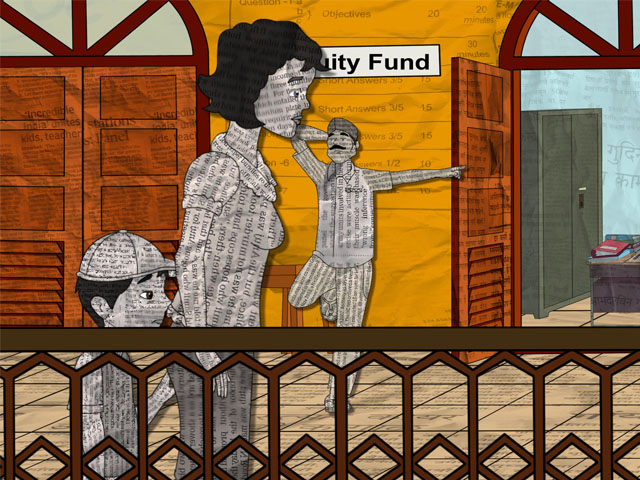 Never would you have imagined that law would have anything to do with animation, but that is precisely what Metamorphosis founder Dhvani Desai did with her animated film Chakravyuh, which has been officially selected in the most prestigious Holland Animation Film Festival 2015, which is also among the top 10 animation film festivals around the world.
Never would you have imagined that law would have anything to do with animation, but that is precisely what Metamorphosis founder Dhvani Desai did with her animated film Chakravyuh, which has been officially selected in the most prestigious Holland Animation Film Festival 2015, which is also among the top 10 animation film festivals around the world.
The mere selection of an Indian animation film in such a renowned festival is a matter of national pride and Dhvani’s movie certainly does have a great chance of winning big given its performance in earlier festivals across the globe.
The film tackles the Right to Information (RTI) act in the country, which is not known to many in the country. Produced by the Films Divison, Dhvani Desai is the hands behind the animation. She has used the Act several times for obtaining information in her personal life. Inspired by the success she achieved, she decided to inform others through an animated short film.
The four minute long movie is inspired by real life stories and narrates tales of four individuals with diverse backgrounds from various parts of the country. The characters are made out of newspaper cuttings symbolising the fact that information is available all around us. Though the stories of the four characters are unrelated, they all have one solution in the form of RTI.
“I have had firsthand experience of using the RTI Act and I was determined to make an animated movie on it for educating the masses and indeed I got feedback from many stating that they were surprised to find out how much they can get out of it. While getting into a government office is easy, it’s a challenge to get out of it. It is similar to a Chakravyuh (giving rise to the movie name),” shares Dhvani while speaking to AnimationXpress.com. Made in 2013, a team of 13 people put seven months of effort into it.

Since it was based on a legal act, Dhvani says that she had to be cautious in approach and bring out the right interpretation from it. She approached the Films Division, who weren’t easy to convince considering that it was being made on a tool that would fight corruption in the government itself. But after some persuasion, they agreed to produce the movie, which has gone on to win several awards such as ‘Most Popular Film’ award at the Mumbai International Film Festival 2014, and recognitions from the Ministry of Personnel, Public Grievances and Pension, DOPT and Yashada.
The animation used is 2D in order to fit in with the newspaper cutting characters. According to her, the story demands the style and for this, 2D fit best.
The short film has no dialogues but just a narration in the form of a satirical poem written by her brother Sanskar Desai, who is a documentary film maker. “Normal narration would have made it too dry and if I didn’t use dialogues, the message wouldn’t have been conveyed appropriately,” she expounds. The narration is in Hindi by Manohar Mahajan, with English subtitles. Her earlier film Manpasand also has two songs written by her father Sudhir Desai, a renowned poet in Gujarati.
On the state of the animation industry, she feels that there should be a lot more encouragement for people to produce short films rather than just concentrate on work that is outsourced to India. “While it is good to work for big names, it is a proud moment to have something come out of your own country too,” she signs off.
